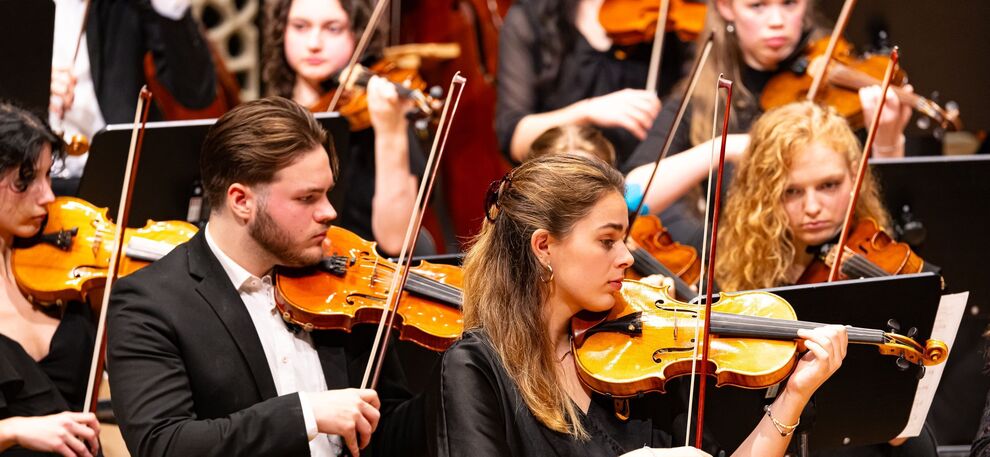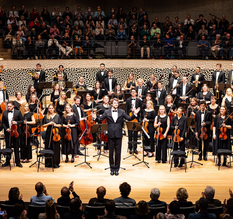


Die verlorene Melodie

Sprecher*in
N.N.
Sorry, there is no biography available at the moment.

Musikalische Leitung
Holly Hyun Choe
Sorry, there is no biography available at the moment.
photo: (c) Emily Turkanik

Mitglieder des Philharmonischen Staatsorchesters Hamburg
The Philharmonic State Orchestra is Hamburg’s largest and oldest orchestra, looking back on many years of musical history. When the “Philharmonic Orchestra” and the “Orchestra of the Hamburg Municipal Theatre” merged in 1934, two tradition-steeped orchestras combined. Philharmonic concerts have been performed in Hamburg since 1828, artists such as Clara Schumann, Franz Liszt and Johannes Brahms being regular guests of the Philharmonic Society. The history of the opera company goes back even further: Hamburg has been home to musical theatre since 1678, even if a regular opera or theatre orchestra was only formed later. To this day, the Philharmonic State Orchestra has embodied the sound of the Hansa City, a concert and opera orchestra in one.
During its long history, the orchestra encountered great artist personalities. Apart from composers of the 18th, 19th and 20th centuries, such as Telemann, Tchaikovsky, Strauss, Mahler, Prokofiev and Stravinsky, since the 20th century chief conductors such as Karl Muck, Joseph Keilberth, Eugen Jochum, Wolfgang Sawallisch, Horst Stein, Aldo Ceccato, Christoph von Dohnányi, Gerd Albrecht, Ingo Metzmacher and Simone Young have shaped the orchestra’s sound. Renowned conductors of the pre-war era such as Otto Klemperer, Wilhelm Furtwängler, Bruno Walter, Karl Böhm and Hans Schmidt-Isserstedt gave brilliant performances, as did outstanding conductors of our times: suffice it to mention Christian Thielemann, Semyon Bychkov, Kirill Petrenko, Sir Neville Marriner, Valery Gergiev and Sir Roger Norrington.
Starting with the 2015/2016 season, Kent Nagano has taken on the position of Hamburg’s General Music Director and Chief Conductor of the Philharmonic State Orchestra and the Hamburg State Opera. In his first season Kent Nagano initiated a new project, the Philharmonic Academy, focusing on experimentation and chamber music. In 2016 Nagano and the Philharmonic undertook a successful three-week concert tour in South America, a tour of Spain followed in 2019. Since 2017 Kent Nagano and the Philharmonic State Orchestra have continued the traditional Philharmonic Concerts at the new Elbphilharmonie, for which they commissioned Jörg Widmann to compose the oratorio ARCHE, which was given its world premiere during the hall’s opening festivities. The concert recording has been released at ECM.
The Philharmonic State Orchestra offers approximately 35 concerts per season and performs more than 240 performances per year at the Hamburg State Opera and the Hamburg Ballet John Neumeier, making it Hamburg’s busiest orchestra. The stylistic bandwidth covered by the 140 musicians, ranging from historically informed performance practice to contemporary works and including concert, opera and ballet repertoire, is unique throughout Germany. Chamber Music has a long tradition at the Philharmonic State Orchestra: what began in 1929 with a concert series for chamber orchestra has been continued since 1968 by a series of chamber music only.
In 2008 Simone Young and the Philharmonic State Orchestra won the Brahms Award of the Schleswig-Holstein Brahms Society. The orchestra has recorded the complete Ring by Wagner as well as the complete symphonies of Johannes Brahms and Anton Bruckner – the latter in the rarely-performed original versions – as well as works by Mahler, Hindemith and Berg, and has released DVDs of opera and ballet productions by Hosokawa, Offenbach, Reimann, Auerbach, J.S. Bach, Puccini, Poulenc and Weber.
The members of the Philharmonic State Orchestra feel equally beholden to Hamburg’s musical tradition and responsible for the city’s artistic future. Since 1978 the musicians have been participating in education programmes in Hamburg’s schools. Today, the orchestra maintains a broad education programme, including school and kindergarten visits, patronage for music projects, introductory events for children and family concerts. The orchestra’s own academy prepares young musicians for their professional careers. The Philharmonic’s musicians thereby make an equally enjoyable and valuable contribution to tomorrow’s music education in the music metropolis of Hamburg.
photo: Foto: Felix Broede

Mitglieder des Landesjugendorchesters Hamburg
The Hamburg Youth Orchestra (LJO), founded in 1968 as the State Youth Orchestra of the Free and Hanseatic City of Hamburg, is one of the oldest State Youth Orchestras in the Federal Republic.
In the 1960s there were only a few school and music school orchestras. Against this background, the Office for Youth took the initiative to create a symphony orchestra for young people interested in music, which would also represent a musical challenge for the young people. The first orchestra course took place in 1966, but failed because the literature exceeded the young people's playing skills. The conductor also had no experience with rehearsals with amateurs or aspiring professionals.
For the young people taking part, these experiences prompted them to think about how they imagined a symphonic orchestra: weekly rehearsals and the determination of the programs and the conductor by the orchestra members were the main points. The young people wanted to have the organization of the orchestra in their own hands and turned to the Youth Office with these ideas. The authority welcomed the young people's ideas to focus on the youth-care aspect of this community in the form of self-administration in addition to the artistically demanding training.
With the vision of a self-governing youth orchestra, the HJO was founded in 1968 as a state youth orchestra. The Youth Office provided the financial resources and developed the structure of the orchestra together with the young people; the first rules of procedure were adopted in 1970.
A self-managed orchestra was a novelty in the German orchestra landscape. A board elected by the orchestra should be responsible for all matters. After the initial framework conditions had been created, only continuous work showed which tasks were vital for the orchestra. According to needs, specific areas of responsibility were linked to the individual board positions.
The first conductor of the Hamburg Youth Orchestra was Herbert Bruhn, who studied at the University of Music and who founded the “Altona Chamber Orchestra” with Matthias Rieger; Together with the members of their orchestra, they were instrumental in founding the HJO.
Herbert Bruhn belonged to Professor Wilhelm Brückner-Rüggeberg's conducting class, who was recruited as a mentor for the young orchestra. In this capacity, he advised the youth orchestra on the selection of new conductors and occasionally carried the baton.
In 1983 the sponsorship changed from the Youth Office to the Cultural Authority. Over the years the number of members has increased to currently around 80 young musicians. The rehearsals were regularly supported by experienced musicians from professional orchestras. In addition to regular rehearsals and the rehearsal of three symphony programs each year, the young people organize chamber music projects and concert tours.
With the increasing level of musical training and instrumental skills of the young people, their growing musical demands, reflected in the choice and presentation of the concert programs, the Hamburg Youth Orchestra established itself in Hamburg's musical life; This was followed by joint projects with choirs and the Hamburg University of Music. The orchestra played at trade fair and congress openings, was invited to perform alongside renowned professional orchestras at the Hamburg Music Festival between 1989 and 1995 and appeared as a representative of the city at the Hamburg Days in Gdansk, Marseille and Prague.
Despite the high fluctuation that is usual for youth orchestras and the increased demands, both musically and organizationally, the democratic structure has endured to this day; only the number of positions and their profiles change in accordance with the growing tasks of the orchestra and the demands of the young people.
In 2005, the orchestra renamed itself the “Landesjugendorchester Hamburg” to emphasize the orchestra's status as the city of Hamburg's selection orchestra.
In 2007, the orchestra's sponsorship changed from the cultural authority to the Hamburg State Music Council. In the course of this change, the organizational structure was also significantly changed: from now on, the State Youth Orchestra was a project of the State Music Council. The resulting new framework conditions in particular resulted in some restrictions on the orchestra's self-administration, but self-administration was largely preserved within the framework of jointly developed rules of procedure.
In 2018, the Hamburg State Youth Orchestra celebrated its 50th anniversary.
